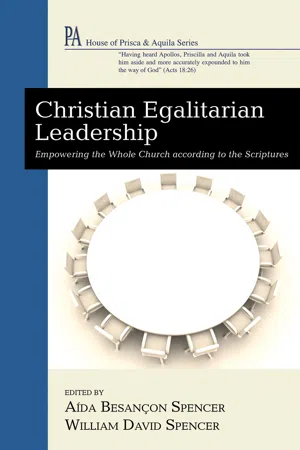
Christian Egalitarian Leadership
Empowering the Whole Church according to the Scriptures
- 326 pages
- English
- ePUB (mobile friendly)
- Available on iOS & Android
Christian Egalitarian Leadership
Empowering the Whole Church according to the Scriptures
About this book
Much has been written on servant leadership, but it is not always tied to egalitarian leadership. Sometimes authority and power instead of God's love are presented as the core of the Christian faith. The church at times derails, imitating worldly culture, emphasizing entitlement that relies on an innate or permanent human hierarchy of rank. Responding to today's conflict over leadership, Christian Egalitarian Leadership calls us back to its biblical roots: what is Christian egalitarian leadership? Why is it biblical? How does it work? Thoughtful and devout Christian leaders carefully explain how sharing leadership follows God's intentions and is crucial to implement today.The theoretical and practical ramifications of these concepts are extended to many areas of the Christian life by numerous qualified individuals, women and men of different races and economic and social classes. Chapters overview New Testament teachings, biblical authority, Old Testament and contemporary examples, God's intention at creation, pagan philosophy's influence on Christian hierarchal leadership, multicultural and multi-ethnic leadership in the United States and Africa, marriage, rearing children, equipping youth and laity, church planting, retirement, and missions, from the cradle to the mission field.
Frequently asked questions
- Essential is ideal for learners and professionals who enjoy exploring a wide range of subjects. Access the Essential Library with 800,000+ trusted titles and best-sellers across business, personal growth, and the humanities. Includes unlimited reading time and Standard Read Aloud voice.
- Complete: Perfect for advanced learners and researchers needing full, unrestricted access. Unlock 1.4M+ books across hundreds of subjects, including academic and specialized titles. The Complete Plan also includes advanced features like Premium Read Aloud and Research Assistant.
Please note we cannot support devices running on iOS 13 and Android 7 or earlier. Learn more about using the app.
Information
Table of contents
- Title Page
- Christian Egalitarian Leadership Empowering the Whole Church according to the Scriptures Edited by Aída Besançon Spencer and William David Spencer
- List Contributors
- Acknowledgements
- Introduction
- Part 1 Theory
- Chapter 1: An Overview of the New Testament Teachings on Christian Egalitarian Leadership
- Chapter 2: Egalitarianism and Biblical Authority
- Chapter 3: Women Discipling Men: A Biblical Pattern of Leadership
- Chapter 4: Equal Leadership: God’s Intention at Creation
- Chapter 5: Influence of Plato and Aristotle’s Patriarchy on Christian Hierarchy Today
- Part 2 Practice
- Chapter 6: The Multicultural Aspect of Egalitarian Leadership
- Chapter 7: Egalitarian Multiethnic Leadership in the United States
- Chapter 8: Egalitarian Faith Nurturing in the African Context
- Chapter 9: Our Egalitarian Marriage: Diverse yet United and Completing and Complementing Each Other
- Chapter 10: Rearing Egalitarian Children
- Chapter 11: Equipping Young People to Build Healthy Relationships: Consider It, Take Counsel, and Speak Up
- Chapter 12: God’s People for All Seasons: Sharing Ministry with Laypeople
- Chapter 13: Gender Equality in the Church as a Model for the Neighborhood
- Chapter 14: Communal Decision Making and the Fate of Retiring Pastors
- Chapter 15: Egalitarian Leadership in Global Mission
- Conclusion